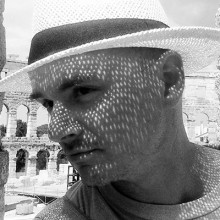Polish literature

Artur Grabowski
Born 1967 in Cracow. Writer, critic, and theatrical creator, professor at the Jagiellonian University, he also lectured at American universities.
He debuted as a poet in the "bruLion" circle with the volume Z didaskaliów (“Stage Directions”, 1991). Then came the following: Pojedynek (“Duel”, 1998), Ziemny początek (“Earthly Beginning”, 2000), Szary człowiek (“Grey Man”, 2007), Jaśnienie (“Brightening”, 2011). Grabowski's poems form a poetic treatise on the identity defined among the intensely sign-based perception of the world, traveling among the symbols of tradition still present but inescapably unstable. At the same time, the author seeks archetypical, permanent sources of poeteering and variable forms of poetry - harmony and contradiction. He probes the languages of tradition and, at the same time, he allows the everyday speech of people and… things to resound (some lyrics give the impression as if things speak for themselves within them). Sometimes one can get the impression that writing a poem is a kind of meditation for Grabowski - attention, epiphany, vision. Yet his poetry is also, in a subtle way, self-ironic, insecure, and unsure of the world... He made his debut as a playwright in 1994 in “Dialog” monthly. Grabowski's early dramas are collected in the volume Do trzech razy s z t u k a (“Third Time Lucky”), which opens with Monodram na dwie role (“A Monodrama in Two Roles”), with an image of marriage as an allegory of human fate, Miejsce (“A Place”), on the other hand, is a kind of tragicomedy in the Mrożek-Ionesco staffage, based on the metaphor for theatre in the theatre of stories about civilisation, modern Europe, and Poland after the first years of change. Czwarta osoba (“The Fourth Person”) is a kind n of epic-symbolic story about Poland immediately after the breakthrough, in the form of a contemporary romantic drama, with a three-layer structure in which the action plans - family, historical, metaphysical - overlap. In the meantime, there was also the outdoor Studnia (“The Well”), enthusiastically received in Italy. In the next volume Trzy, cztery – tragedia! (“On the Count of Three - Tragedy!”, 2015), we can find the voice monodrama Następca (“Successor”) and a series of eight short micro-tragedies Cnota Zachodniej Cywilizacji (“The Virtue of Western Civilisation”, 2007), originally presented in Zagreb. These are sharp pictures, sometimes drastic, consciously unresolved in the characters’ judgement. The long drama Tłumaczenie śpiewu kozła (“Explanation of the Goat's Singing”) - a kind of "transcription" of Powrót Odysa (“Return of Odysseus”), aesthetically inspired by Wyspiański’s and... Kantor's dramatic concept - is something completely different. It is a formally complicated and multifaceted text, stylistically diverse and led in two planes: both a literary self-aware myth and a contemporary fantasy about this myth, with fictional characters entering into a dialogue with the real ones, arranged in the structure of a sacrificial ritual. The structure is based on a tragedy of revenge, but impossible to realise due to the ontological uncertainty of the world and the weak identity of the protagonist. The last dramas by the author are Pasaże i bramy (“Passages and Gates”), premiere in Paris), based on the pattern of the Stations of the Cross and Derby. Białoczerwoni (“Derby. The White and Reds”), staged in Łódź and awarded the Golden Mask Award. Grabowski is also the author of short stories (they can be found in magazines) and a wide range of scientific and meditative forms. They open with an original dissertation on the semantics of versification Wiersz - forma i sens (“Poem - Form and Meaning”, 1999). Its theoretical inclination will not be repeated in later texts which will be closer to the essay. The essayistic volume Klatka z widokiem (“A Cage with a View”, 2004) is a peculiar treatise on the self-awareness of modern literature, with a thesis on aesthetics as a substitute for the un-metaphysicalised philosophy that modernism longs for. The compositional axis of the collection Uzmysłowienia (“Realisations”, 2010), containing reflections on theatre and visual arts, is the problem of seeing as a sensual perception of reality, as well as "super-reality", because the last text - about Hopper's painting and theatre – treats on "natural mysticism", unrelated to any particular religion or even culture. The book Herbert-Hermes (2013), in turn, is maintained in the poetics of a high scientific essay. Herbert's essays, poetry, and dramas are the starting point for philosophical considerations about the ethical confrontation of the protagonists with the destructive, weakening pressure of modernity.
– Wojciech Kudyba
BIBLIOGRAPHY:
- Wiersz – forma i sens (theory of poems – Cracow 1999).
- Klatka z widokiem (literary essays – Cracow 2004).
- Uzmysłowienia (essays on visual arts – Cracow 2010).
- Herbert-Hermes. Konteksty nowoczesności w esejach, dramatach i wierszach Zbigniewa Herberta (comparative monograph – Cracow 2013)
- Z didaskaliów. 1986-89 (poems - Cracow 1991).
- Pojedynek. 1990-96 (poems – Warsaw 1998).
- Ziemny początek (poems - Cracow 2000).
- Szary człowiek (poems - Cracow 2007).
- Jaśnienie (poems - Sopot 2011).
- Do trzech razy s z t u k a (3 dramas - Cracow 1999).
- Cnoty zachodniej cywilizacji (drama published in Croatian - Zagrzeb 2008).
- Trzy, cztery – tragedia! (4 dramas - Cracow 2015).
- Ładne kwiatki, Sopot 2018
- Wersje, 2018
- Am (the journal from the other side), Warsaw 2018